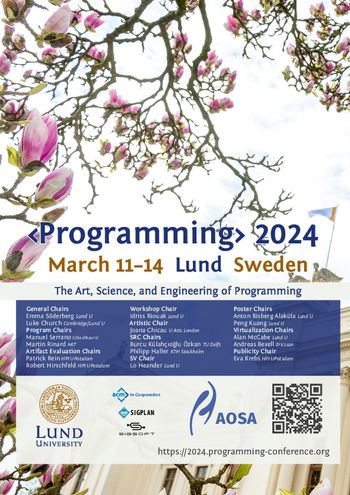Post date:
Acronym:
Dates:
Web page:
Submission deadline:
Location:
Overview
Classical computing is reaching its limit. Thus, there is a need to revolutionize the current form of computing. Towards this end, quantum computing is one of the promising computing paradigms. However, programming quantum computers differs significantly from classical computing due to novel features of quantum computing, such as superposition and entanglement. Thus, the Art, Science, and Engineering of Quantum Programming differ from classical programming. Therefore, there is a need to initiate a discussion on the art, science, and engineering of quantum programming and its relation to classical programming. QP2024, thus, will provide a platform for researchers and practitioners interested in various aspects of quantum programming and its relation with classical programming to discuss research challenges, possible solutions, and future research directions. Such discussion could build the road map for the Art, Science, and Engineering of Quantum Programming.
QP 2024 will provide a platform for researchers and practitioners interested in the Art, Science, and Engineering of Quantum Programming and its relation with classical programming to discuss research challenges, possible solutions, and future research directions. Such discussion could build the road map for quantum programming.
The workshop is organized as a part of The International Conference on the Art, Science, and Engineering of Programming (Programming› 2024) We foresee QP as a specialization of the Programming 2024 conference; thus, all the topics from Programming 2024 tailored to quantum programming are relevant for QP2024.
The workshop is intended for researchers, including students, at any stage of their careers. Moreover, practitioners are also a relevant audience for the workshop.
Submission Types
We invite submission of papers of the following types:
- Regular papers (8 pages): Novel research works, experience reports
- Position paper (2 pages): Describing a well-argued position.
- Lighting Talks (Only Abstract, No Publication): challenges
Regular papers will be evaluated with respect to the real-world significance of the described quantum programming experience as well as their ability to forge partnerships and ultimately yield successful solutions. Position papers represent a position on any aspect of the Art, Science, and Engineering of Quantum Programming with good argumentation. Lighting talks are abstracts that describe late-breaking results, work in progress, or real-world challenges. Both position papers and lighting talks abstracts will be evaluated according to their ability to generate discussion and suggest interesting areas for future research.
Submission Instructions
Please follow the ACM acmart format v1.87 or newer and submit papers as a PDF file: https://www.acm.org/publications/proceedings-template. If using LaTeX, please use the following class configuration: \documentclass[sigconf,screen]{acmart}.
Submission page: https://easychair.org/conferences/?conf=qp2024
Submission deadline: 22 January 2024.
Publications for Papers
Please note that the accepted papers will be published as part of the
companion of Programming 2024 in the ACM DL. Publication in the ACM DL
is conditional on the acceptance by the program committee.
Workshop Format
QP2024 will feature two types of events. First, we will have a session on presenting papers accepted in the workshop. The rest of the workshop will be focused on a dedicated discussion of the workshop topics in a similar fashion as Dagstuhl or Shonan to draft a roadmap on the topic of the workshop. The workshop organizers will send invitations to the researchers working in this area. However, the workshop is open to anyone who is interested. Please consult the workshop chairs if you are interested in joining the workshop.
Organizing Committee
- Paolo Arcaini, National Institute of Informatics, Japan
- Tao Yue, Beihang University, China
- Jianjun Zhao, Kyushu University, Japan
Program Committee
- Rui Abreu, Faculty of Engineering, University of Porto, USA
- Shaukat Ali, Simula Research Laboratory and Oslo Metropolitan University, Norway
- Johanna Barzen, University of Stuttgart, Germany
- Carmelo R. Cartiere, University of Oxford, UK
- Ross Duncan, Cambridge Quantum Computing, UK
- Sebastian Feld, Delft University of Technology, Netherlands
- Yuan Feng, Centre for Quantum Software and Information, University of Technology Sydney, Australia
- Ichiro Hasuo, National Institute of Informatics, Japan
- Shaohan Hu, JPMorgan Chase & Co, United States
- Wolfgang Mauerer, OTH Regensburg / Siemens AG
- Jaroslaw Adam Miszczak, Institute of Theoretical and Applied Informatics, Polish Academy of Sciences, Poland
- Hausi Müller, University of Victoria, Canada
- Mario Piattini, University of Castilla-La Mancha, Spain
- Robert Rand, University of Chicago, United States
- Wille Robert, Johannes Kepler University Linz, Austria
- Shinobu Saito, NTT, Japan
- Ina Schaefer, KIT, Germany
- Luís Soares Barbosa, Universidade do Minho, Portugal
- Davide Taibi, University of Oulu and Tampere University, Finland
- Manuel Wimmer, JKU Linz, Austria
- Nengkun Yu, Stony Brook University, USA
- Lei Zhang, University of Maryland Baltimore County, USA

